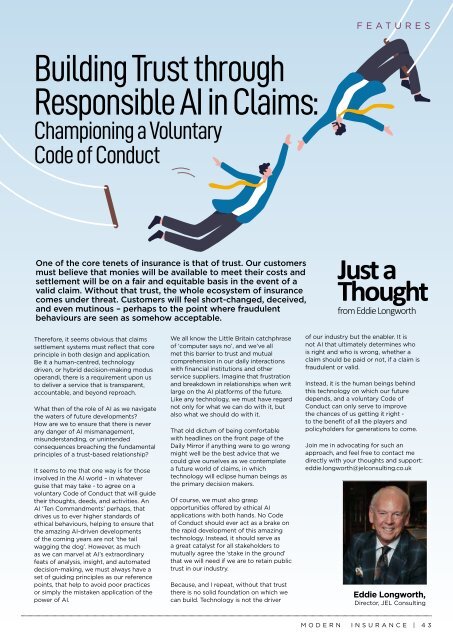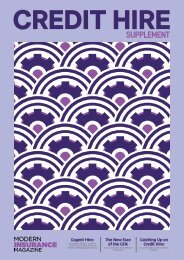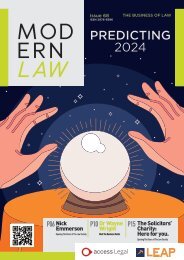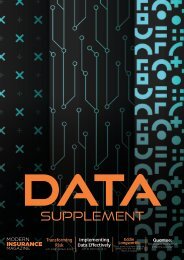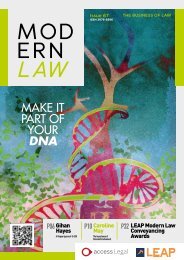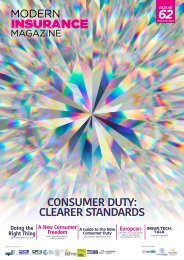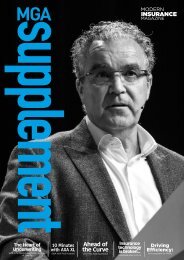Modern Insurance Magazine Issue 60
This issue features... Insight: Every Cloud Has A Silver Lining, by Tim Yeates, Co-Founder, Carbon1 Ltd. Interview: Modelling Modern Risk with Dr Kirsten Mitchell-Wallace, Director of Portfolio Risk Management, Lloyd’s of London Interview: Searching for Answers with Iain Willis, Research Director, Gallagher Research Centre Editorial Board: Find out what our editorial board panel of experts have to say in this edition of Modern Insurance Magazine A Final Word with Steve White, Chief Executive, British Insurance Brokers' Association (BIBA) Is it time for Risk Managers to rethink their role in the Climate Crisis? by François Lanavère, Head of Strategic Partnerships, AXA Climate Associations Assemble: Modern Insurance’s panel of resident associations outline the burning issues in insurance Just a Thought with Eddie Longworth - Building Trust through Responsible AI in Claims: Championing a Voluntary Code of Conduct Making Efficiency Gains in Subsidence Claims, by Chris Carlton MRICS, New Business & Key Account Director, Geobear Chemistry for a Sustainable Future: Q&A with Grant Dempsey, Sales Manager - Distribution, BASF Automotive Refinish UK & Ireland Industry Collaboration: Working together to provide the best mobility solution, with James Roberts, Business Development Director, Insurance, Europcar Mobility Group UK Thinking Upside Down: Mind the Protection Gap, by Ashley Preece, Product Owner, Claim Technology In Conversation with… Neil Garrett, UK, South Africa & Nordics Sales Director, Solera | Audatex A New Climate for Claims, from I Love Claims / ARC 360 10 Mins with… Ola Jacob, Independent Insurance Advisor In Celebration: Modern Claims Awards 2023 Insur.Tech.Talk - Interviews with Stephen Weinstein, Former Chair of the Bermuda Business Development Agency; Bill Churney, President, Extreme Event Solutions, Verisk; Jacqui LeGrand, CEO, Maptycs; Heather H. Wilson, Chief Executive Officer, CLARA Analytics Insur.Tech.Talk Editorial Board - Experts from within the insurtech sector and beyond join us once more to share their unique insights!
This issue features...
Insight: Every Cloud Has A Silver Lining, by Tim Yeates, Co-Founder, Carbon1 Ltd.
Interview: Modelling Modern Risk with Dr Kirsten Mitchell-Wallace, Director of Portfolio Risk Management, Lloyd’s of London
Interview: Searching for Answers with Iain Willis, Research Director, Gallagher Research Centre
Editorial Board: Find out what our editorial board panel of experts have to say in this edition of Modern Insurance Magazine
A Final Word with Steve White, Chief Executive, British Insurance Brokers' Association (BIBA)
Is it time for Risk Managers to rethink their role in the Climate Crisis? by François Lanavère, Head of Strategic Partnerships, AXA Climate
Associations Assemble: Modern Insurance’s panel of resident associations outline the burning issues in insurance
Just a Thought with Eddie Longworth - Building Trust through Responsible AI in Claims: Championing a Voluntary Code of Conduct
Making Efficiency Gains in Subsidence Claims, by Chris Carlton MRICS, New Business & Key Account Director, Geobear
Chemistry for a Sustainable Future: Q&A with Grant Dempsey, Sales Manager - Distribution, BASF Automotive Refinish UK & Ireland
Industry Collaboration: Working together to provide the best mobility solution, with James Roberts, Business Development Director, Insurance, Europcar Mobility Group UK
Thinking Upside Down: Mind the Protection Gap, by Ashley Preece, Product Owner, Claim Technology
In Conversation with… Neil Garrett, UK, South Africa & Nordics Sales Director, Solera | Audatex
A New Climate for Claims, from I Love Claims / ARC 360
10 Mins with… Ola Jacob, Independent Insurance Advisor
In Celebration: Modern Claims Awards 2023
Insur.Tech.Talk - Interviews with Stephen Weinstein, Former Chair of the Bermuda Business Development Agency; Bill Churney, President, Extreme Event Solutions, Verisk; Jacqui LeGrand, CEO, Maptycs; Heather H. Wilson, Chief Executive Officer, CLARA Analytics
Insur.Tech.Talk Editorial Board - Experts from within the insurtech sector and beyond join us once more to share their unique insights!
You also want an ePaper? Increase the reach of your titles
YUMPU automatically turns print PDFs into web optimized ePapers that Google loves.
FEATURES<br />
Building Trust through<br />
Responsible AI in Claims:<br />
Championing a Voluntary<br />
Code of Conduct<br />
One of the core tenets of insurance is that of trust. Our customers<br />
must believe that monies will be available to meet their costs and<br />
settlement will be on a fair and equitable basis in the event of a<br />
valid claim. Without that trust, the whole ecosystem of insurance<br />
comes under threat. Customers will feel short-changed, deceived,<br />
and even mutinous – perhaps to the point where fraudulent<br />
behaviours are seen as somehow acceptable.<br />
Just a<br />
Thought<br />
from Eddie Longworth<br />
Therefore, it seems obvious that claims<br />
settlement systems must reflect that core<br />
principle in both design and application.<br />
Be it a human-centred, technology<br />
driven, or hybrid decision-making modus<br />
operandi, there is a requirement upon us<br />
to deliver a service that is transparent,<br />
accountable, and beyond reproach.<br />
What then of the role of AI as we navigate<br />
the waters of future developments?<br />
How are we to ensure that there is never<br />
any danger of AI mismanagement,<br />
misunderstanding, or unintended<br />
consequences breaching the fundamental<br />
principles of a trust-based relationship?<br />
It seems to me that one way is for those<br />
involved in the AI world – in whatever<br />
guise that may take - to agree on a<br />
voluntary Code of Conduct that will guide<br />
their thoughts, deeds, and activities. An<br />
AI ‘Ten Commandments’ perhaps, that<br />
drives us to ever higher standards of<br />
ethical behaviours, helping to ensure that<br />
the amazing AI-driven developments<br />
of the coming years are not ‘the tail<br />
wagging the dog’. However, as much<br />
as we can marvel at AI’s extraordinary<br />
feats of analysis, insight, and automated<br />
decision-making, we must always have a<br />
set of guiding principles as our reference<br />
points, that help to avoid poor practices<br />
or simply the mistaken application of the<br />
power of AI.<br />
We all know the Little Britain catchphrase<br />
of ‘computer says no’, and we’ve all<br />
met this barrier to trust and mutual<br />
comprehension in our daily interactions<br />
with financial institutions and other<br />
service suppliers. Imagine that frustration<br />
and breakdown in relationships when writ<br />
large on the AI platforms of the future.<br />
Like any technology, we must have regard<br />
not only for what we can do with it, but<br />
also what we should do with it.<br />
That old dictum of being comfortable<br />
with headlines on the front page of the<br />
Daily Mirror if anything were to go wrong<br />
might well be the best advice that we<br />
could give ourselves as we contemplate<br />
a future world of claims, in which<br />
technology will eclipse human beings as<br />
the primary decision makers.<br />
Of course, we must also grasp<br />
opportunities offered by ethical AI<br />
applications with both hands. No Code<br />
of Conduct should ever act as a brake on<br />
the rapid development of this amazing<br />
technology. Instead, it should serve as<br />
a great catalyst for all stakeholders to<br />
mutually agree the ‘stake in the ground’<br />
that we will need if we are to retain public<br />
trust in our industry.<br />
Because, and I repeat, without that trust<br />
there is no solid foundation on which we<br />
can build. Technology is not the driver<br />
of our industry but the enabler. It is<br />
not AI that ultimately determines who<br />
is right and who is wrong, whether a<br />
claim should be paid or not, if a claim is<br />
fraudulent or valid.<br />
Instead, it is the human beings behind<br />
this technology on which our future<br />
depends, and a voluntary Code of<br />
Conduct can only serve to improve<br />
the chances of us getting it right -<br />
to the benefit of all the players and<br />
policyholders for generations to come.<br />
Join me in advocating for such an<br />
approach, and feel free to contact me<br />
directly with your thoughts and support:<br />
eddie.longworth@jelconsulting.co.uk<br />
Eddie Longworth,<br />
Director, JEL Consulting<br />
MODERN INSURANCE | 43


